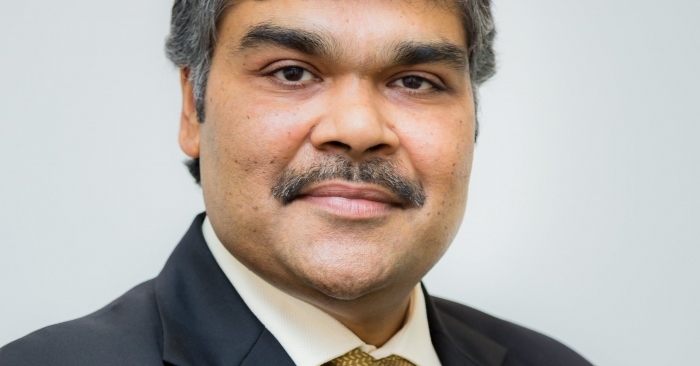Infra, tech, experts put us in strong position to move Covid vaccine: Vivek Arya, MD, Rhenus Logistics India
In an exclusive interview with Indian Transport and Logistics News, Vivek Arya, managing director of Rhenus Logistics India, talks about their business of moving temp-controlled pharmaceuticals in India, challenges, regulations and even about how to move a potential Covid-19 vaccine.

October 1, 2020: The Rhenus Group is a logistics service provider with global business operations and an annual turnover of EUR 5.5 billion. Rhenus has business sites at 750 locations worldwide and employs 33,000 people. The Rhenus Group provides solutions for a wide variety of different sectors along the complete supply chain; they include multimodal transport operations, warehousing, customs clearance as well as innovative value-added services.
In an exclusive interview with Indian Transport & Logistics News, Vivek Arya, managing director of Rhenus Logistics India, talks about their business of moving temp-controlled pharmaceuticals in India, challenges, regulations and even about how to move a potential Covid-19 vaccine.
Give us a sense of how profitable is the business of temp-controlled pharma logistics in India, with regards to the demand & supply in the market?
The Indian market is very fragmented with many small players offering temperature-controlled warehousing as well as transportation. The assets invested are used both for perishables like fruits and vegetables as well as pharmaceuticals. The geographical spread of manufacturing units for pharma as well as the need around maintaining the temperature integrity through the travel to interior markets poses a big challenge for the logistic operators.
The demand for temperature-controlled logistics is rising as the regulatory framework improves and its implementation is made more stringent. The efforts by the government to create better facilities in terms of hospitals and health centres at the district level and beyond is further adding to the demand.
The specialization needed in this area of logistics and the need for integrity of the cold chain offers a profitable business opportunity for the logistics players.
Due to the acute shortage of temperature-controlled warehousing and surface transportation for long service providers that have invested or directly control the asset and capacities on this end are able to achieve a relatively higher price than normally would from the user. Having said so as the business lacks large multiple professional players most of the invested parties are not able to get reasonable returns on their investments. There is a huge gap in the Industry for large professional players to enter with investments which are subject to the level playing field and long-term commitments from the user fraternity on contractual obligations. Indian users need to make a commitment to quality and temperature integrity over costs. Commitment comes by way of long term contractual obligations based on a win-win situation.
Also read: Time for pharma cold chain to commit for quality, temp integrity over costs
In the area of international transportation both by air/ocean, India has normally been compliant over a longer period as the decision on procurement of logistics services and the quality along with the product integrity is held in the hands of overseas buyers. The temperature compliance is mainly to “regulated markets” whereas now there is a focus to comply in non-regulated markets as well. Due to this temp-controlled air capacity and reefer containers have come into heavy demand and rates are at a premium of at least 25 to 40 percent over normal ambient cargoes. Again, partnerships and relationship that is built on regular and stable volumes between airlines/shipping lines and the client and their selected 3 PL is important to get the optimal rates and achieve better returns on this business.
GDP and CEIV certifications for both facilities and teams are being frantically ramped up as more parties want to get invested/build a base of business and focus on these gaps in the supply chain to get associated and established in this vertical.
The lack of long-term view and commitments followed by the absence of a collaborative approach from the Industry makes the investments and the profitability in this business a deterrent for multiple players to foray in. At Rhenus our motto has always been to have a long-term view and invest behind our customers with commitments to secure our investments. It is difficult to find many genuine takers.

The temperature-controlled warehouse of Rhenus Logistics in Farukhnagar, Gurugram
What are the challenges faced while moving temp-controlled pharmaceuticals in India? How high temperatures, fragmented market, infrastructure and paperwork influence?
The International Air Transport Association (IATA) created the Center of Excellence for Independent Validators in Pharmaceutical Logistics (CEIV Pharma) in 2015. It aims to set the industry standard for air cargo supply chain in pharmaceutical handling excellence. It addresses the industry's need for more safety, security, compliance and efficiency, by the creation of a globally consistent and recognized pharmaceutical product handling certification. CEIV Pharma encompasses, or even supersedes, many of the existing pharmaceutical standards and guidelines, such as IATA Temperature Control Regulations (TCR), European Union Good Distribution Practices (EU GDP), World Health Organization Annex 5, United States Pharmacopeia Standards.
The uncertainty around continuous power supply though considerably reduced in the past three to four years necessitates the installation of generators and results in higher cost of operations.
The shortage of right capacity vehicles with proper design and equipment for domestic transportation is a challenge and will remain so until more and more professional players come into this area of logistics.
The monitoring of temperature during transit by the drivers is a big challenge and needs proper equipment to ensure that the same is done relentlessly
Most of the regulations are based on the international movement. A lot needs to be done at local levels. The specialization needed in this area of Logistics and the need for integrity of the cold chain offers a profitable business opportunity for the logistics players.
Tell us about what the pharmaceutical companies are looking for and what are their demands while hiring a logistics partner like yours?
The pharma clients would like to be assured that all approved vendors and supply chain service providers support the applicable standards expected in terms of facilities, equipment, operations and staff, and can provide seamless cool chain transportation across the entire supply chain.
Suitable and trained teams will also allow us to leverage a strategic advantage in the healthcare logistics market through a stronger, more competitive and enhanced international transportation products.
Unlike matured markets in the western part of the world, India has a lot of catching up to do. For this, the pharma companies need to attract logistics players by offering commitments and encouraging investments to support their cold chain strategy. The sourcing and buying in India cannot be based on the global models which have a robust cold chain in place.

In this backdrop, how equipped the Indian logistics industry & your company to handle a potential Covid-19 vaccine by the end of this year? And what are your recommendations to the industry?
Rhenus India is an integrated logistics service & solution provider, catering to customers across the supply chain including international freight (air & ocean), customs clearance, warehousing and domestic transportation. A robust infrastructure, technology and an experienced team put us in a strong and proactive position to service this critical requirement whenever it comes up in the way of affordable and accessible Covid-19 vaccine first mile / international transportation and last-mile distribution requirements.
Our recommendation to the industry is that given the nature of this virus and its life-saving impact on the patients please make sure that all stakeholders and participants are completely aware, sensitised and highly prepared and trained to play their part in this massive and most critical humanitarian global exercise. It would be very unfortunate if the integrity and the complete protocols of the distribution of these vaccines are not fully maintained and they fail to lead to any single loss of life.
Tell us about how your company has evolved for a particular market and what we could expect from the company in the near future?
Business today is characterized by relentless change. To stay competitive, especially in the situations we are in today, it became more important to adopt and grab some quick opportunities.
We ensured that we were in constant touch with the customers and at the same time further build up the rapport with the carriers, CFS operators to ensure seamless flow of their cargo both inbound and outbound by air/sea apart from some exclusive charter opportunities. We have also updated our team with GDP requirements.
We have also developed our vendor network for sourcing of local transport for temperature-controlled movement to the airports and seaports as and when needed.
A lot has to be seen in the next months and years and let’s hope that India takes a leadership position in the global healthcare and pharma segment.

Libin Chacko Kurian
Assistant Editor at STAT Media Group, he has six years of experience in business journalism covering food & beverage, nutraceuticals and now logistics. His current passion is to understand the nuances of global supply chains and their current turmoil. Outside work, he is also interested in philosophy, history, birding and travelling. Mail him: libin@statmediagroup.com Follow on LinkedIn


